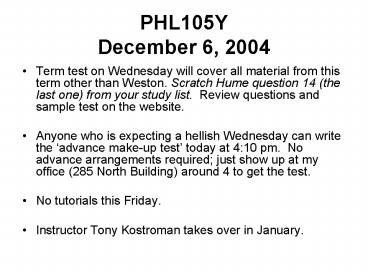PHL105Y December 6, 2004 - PowerPoint PPT Presentation
1 / 19
Title:
PHL105Y December 6, 2004
Description:
Review questions and sample test on the website. ... Stupid people can sometimes be lively and charming. Deviations from character? ... – PowerPoint PPT presentation
Number of Views:54
Avg rating:3.0/5.0
Title: PHL105Y December 6, 2004
1
PHL105YDecember 6, 2004
- Term test on Wednesday will cover all material
from this term other than Weston. Scratch Hume
question 14 (the last one) from your study list.
Review questions and sample test on the website. - Anyone who is expecting a hellish Wednesday can
write the advance make-up test today at 410
pm. No advance arrangements required just show
up at my office (285 North Building) around 4 to
get the test. - No tutorials this Friday.
- Instructor Tony Kostroman takes over in January.
2
Section 8
- Of Liberty and Necessity
3
The problem of freedomPhilosophical, not
practical
- Hume contends that in daily life we have a clear
understanding of liberty and necessity, and the
relation between them - Philosophical theories of freedom have left us
confused because the terms freedom and
necessity have been misused and poorly defined
4
Physical nature and human nature
- We are able to reason about nature because it is
uniform and regular nature is under thorough
causal necessity
5
Physical nature and human nature
- We are able to reason about nature because it is
uniform and regular nature is under thorough
causal necessity - We are able to reason about human nature because
it is uniform and regular human nature is under
thorough causal necessity
6
Human nature is predictable
- The same motives always produce the same
actions The same events follow form the same
causes. Ambition, avarice, self-love, vanity,
friendship, generosity, public spirit these
passions, mixed in various degrees, and
distributed through society, have been, from the
beginning of the world, and still are, the source
of all the actions and enterprises, which have
ever been observed among mankind. (55)
7
Human nature is predictable
- Would you know the sentiments, the inclinations,
and course of life of the Greeks and Romans?
Study well the temper and actions of the French
and English. (55)
8
Character as well as circumstance
- Ones behaviour is determined not simply by ones
outward setting, but also by ones internal
character (also conceived causally) - Custom, education, training, etc. control how we
will respond (so men and women might react
differently in the same setting or members of
different cultures) (57)
9
Deviations from character?
- Nice people can sometimes be mean, suddenly
- Stupid people can sometimes be lively and charming
10
Deviations from character?
- Nice people can sometimes be mean, suddenly
- when they have toothaches
- Stupid people can sometimes be lively and
charming - when they have just won the lottery
11
Matter and action
- Hume argues for a complete parallel between the
total causal order we see in physical nature and
causal determination of our actions we expect
uniformity in both cases, and we steadily make
causal inferences (unsupported objects will fall,
people prefer more money to less, etc.)
12
Matter and action
- Where we see apparent failures of uniformity, or
where our inferences go wrong, we dont suppose
that theres no causal order we suppose that
there are some hidden factors we havent yet
spotted. Erratic behaviour in humans is treated
just as we treat erratic phenomena in geology (we
dont in fact suppose that people act uncaused).
See p.60.
13
True or false?
- If you leave a 100 bill unattended on a table in
Spigel Hall for an hour during lunch rush, the
odds that it will still be sitting there at the
end of the hour are about the same as the odds
that the table will have floated into space
14
True or false?
- If you leave a 100 bill unattended on a table in
Spigel Hall for an hour during lunch rush, the
odds that it will still be sitting there at the
end of the hour are about the same as the odds
that the table will have floated into space - Human actions obey some laws of gravity as much
as tables do.
15
What is liberty?
- a power of acting or not acting, according to
the determination of the will. - You have this unless you are chained to the wall.
16
What about morality?
- Can we praise, blame, or punish people for
actions done under necessity?
17
Morality and freedom
- Just because a theory is dangerous to morality
doesnt mean its false, - But for what its worth, Hume thinks that his
theory is in fact VITAL to supporting morality
(and not in conflict with it at all)
18
Morality and freedom
- If systems of morality are founded on punishments
and rewards, we really want those punishments and
rewards to have pre-determined, predictable
effects on human behaviour
19
Morality and freedom
- Actions deserve moral praise or blame only where
they originate from some lasting cause within the
agent to deny necessity is to deny responsibility































